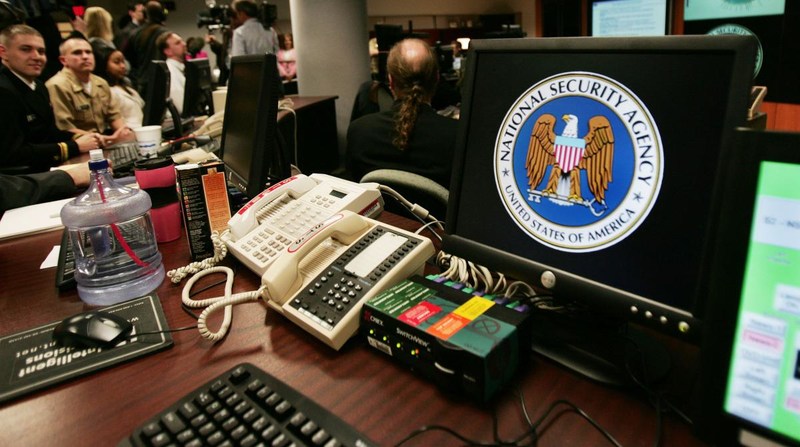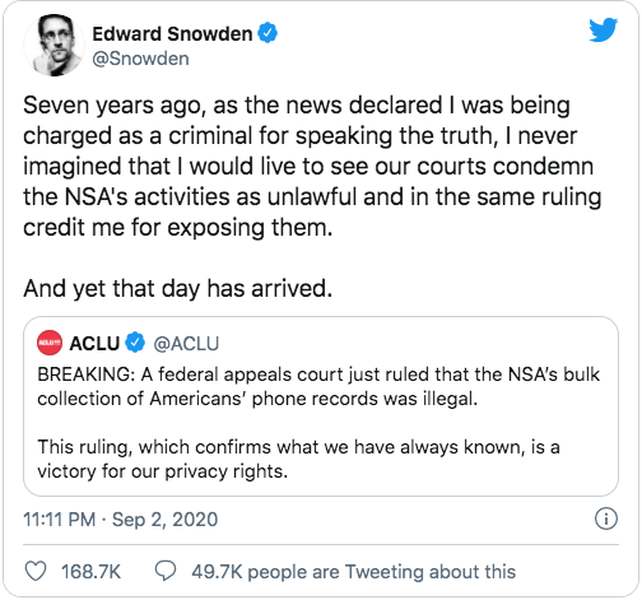Court Finds NSA Phone Data Collection Illegal


- Edward Snowden's Revelations
- The NSA's scheme - collecting phone records
- US court deems NSA program illegal
- Avoid NSA online surveillance with a VPN
In 2013, NSA contractor turned whistleblower Edward Snowden revealed that the agency collected US citizens’ phone records in bulk. Seven years later, a federal appeals court ruled that the program was illegal and possibly unconstitutional.
The call-tracking scheme launched without a court order following the 9/11 attacks in 2001, during the George W. Bush administration. It allowed the National Security Agency to scoop up billions of telephone call details every year, forcing telecom providers to submit daily logs. The program shut down in 2015.
Prosecutors and privacy advocators hailed the decision as a victory for privacy rights. But it proved to be a significant blow to the NSA, who long defended the program, saying it was crucial in preventing terrorist attacks on US soil. And although this was the only NSA initiative deemed unlawful, Snowden’s leaked documents showed much more controversies, especially Internet surveillance.
Who Is Edward Snowden?
Before his career with US government agencies, Edward Snowden enlisted in the army reserve in 2004. But he was discharged months later due to an injury. Then, in 2006, he accepted a job with the CIA after attending a job fair focused on intelligence agencies. He worked at the global communications division at CIA headquarters in Langley, Virginia.
Snowden excelled in his role because he was a “computer wizard.” The CIA stationed him with diplomatic cover in Geneva, Switzerland, where he was in charge of maintaining computer-network security. According to media reports, he was a top technical and cybersecurity expert in the country. The CIA even selected him to support the president at the 2008 NATO summit in Romania.
In 2009, Snowden quit the CIA and started working at Dell as an NSA contractor. He helped officials and military officers at Yokota Air Base (near Tokyo) stay vigilant against Chinese hackers. Dell moved him to Hawaii in 2012, where he worked as lead technologist for the NSA’s information-sharing office.
In 2013, Snowden quit his job at Dell, claiming the Director of National Intelligence, James Clapper, lied under oath to congress. He later joined consulting firm Booz Allen Hamilton as a contractor, admitting he only took the job to gather data about NSA’s surveillance practices. According to a former employee, Snowden was a “genius among geniuses,” which is why his superiors gave him near-unlimited access to NSA data.
“NSA is full of smart people, but anybody who sat in a meeting with Ed will tell you he was in a class of his own…I’ve never seen anything like it.”
NSA Staffer and Snowden’s Co-worker
Snowden Lifts Lid on NSA Phone Surveillance
Snowden said that he took a pay cut to work at Booz Allen Hamilton to collect NSA secrets and publicize them. Months after working there, he traveled to Hong Kong, where he was staying when the leaks were published. The Guardian was the first to break the news, and soon, major media outlets from around the world obtained and shared the documents. They included The Washington Post, The New York Times, Le Monde, and Der Spiegel.
According to The Guardian journalist Glenn Greenwald, Snowden disclosed around 9,000 to 10,000 documents. He also shared NSA-related records with other journalists, including Laura Poitras, Barton Gellman, and Ewen MacAskill.
Among the revelations was an NSA program that collected American citizen’s phone records in bulk. The agency launched it following the September 11 attacks in 2001. In short, US telecom operators had to hand in daily phone call data to the NSA. The information included the date and time of the phone calls, and who is contacting whom. It does not, however, cover the content of the conversation.
The program shut down in 2015 after Congress passed the US Freedom Act, which limited the NSA’s data collection. It states that government agencies must acquire a court order on a case-by-case basis to obtain information from phone companies.
Federal Court Rules NSA Program Unlawful
On September 2nd, the 9th Circuit Court of Appeals ruled that the phone-tracking program was illegal and likely unconstitutional. The NSA and past administrations had long defended it, saying it prevented over 50 terrorist attacks on US territories. But after the Congress looked into it, the program’s only real success was the Basaaly Moalin case.
In 2013, Moalin and three other men were found guilty of raising and sending money to the terrorist group Al-Shabaab. The NSA played a part in the conviction as it collected the phone records of the four criminals. This led to some officials supporting the program, claiming it is vital for homeland security.
However, the three-judge panel unanimously agreed that the role the NSA played was minimal. In fact, it didn’t even reduce or change the four men’s convictions. Former FBI official Sean Joyce‘s testimony said that the call-data program helped them reopen the case. But judge Marsha Berzon argued that its role wasn’t crucial.
Meanwhile, prosecutors, privacy rights advocates, and, of course, Snowden himself, labeled the court’s decision a victory. After the ruling, the latter tweeted he was glad US courts held the NSA responsible for its actions and credited him for exposing the secrets.


Other Revelations
Edward Snowden didn’t just expose the NSA’s call-tracking scheme. He also revealed several more snooping practices the agency conducted, especially in terms of Internet surveillance. Some of these revelations were:
- Five Eyes: A global coalition of government agencies that focuses on monitoring the web. It features the US, Canada, the UK, Australia, and New Zealand. Companies inside these jurisdictions must submit data to the authorities. And members share information with each other.
- PRISM: A program that enables the NSA to collect Internet communications from American Internet companies. According to Snowden’s documents, 98% of PRISM information comes from Google, Microsoft, and Yahoo. Other services include Facebook, Skype, and Apple.
- Tempora: A product of the British GCHQ, it collects Internet communications from fiber-optic cables and stores them for later analysis. It has access to a large amount of users’ sensitive data, with no distinction between citizens and targets. Tempora shares certain data with the NSA. Snowden also claims that it gathers telephone traffic.
- XKeyscore: A tool that allows the NSA to collect, search, and analyze online data worldwide. According to Snowden, this system monitors Internet users everywhere and retrieves their data. Moreover, the NSA shares information with foreign agencies in Australia, Canada, Britain, New Zealand, Germany, and Japan.
Protect Your Online Privacy with a VPN
As you can see, intelligence agencies like the NSA and GCHQ have eyes wide open on pretty much anything that happens online. And they don’t just monitor targets or potential threats; they also collect data on regular Internet users.
We knew that the Internet wasn’t the most private place to visit, but we didn’t expect that level of scrutiny. Snowden’s revelations made people more conscious about online privacy and anonymity, hence the rise of VPN usage worldwide.
VPNs are cybersecurity tools that hide your online activities and connection. They operate a private server network through which you can reroute your traffic. Once you connect to a server, your VPN will change your IP address, making you appear in a different country. It also encrypts the data you send or receive, making it impossible for government agencies and ISPs to see what you’re doing.
Furthermore, top VPN services follow a zero-logging policy, meaning they erase sensitive data from their servers. That includes your IP address, the websites you visit, and your browsing history. And to avoid any potential leaks, they use a kill switch to terminate Internet access. That way, if they malfunction, your traffic won’t rechannel to your ISP’s servers.
In addition to privacy protection, VPNs allow you to unblock streaming platforms and safely download files through P2P networks. They also help you avoid online censorship if you live in countries like China, for example.
However, not all VPNs offer these features, which is why you must only consider the best VPN services.



